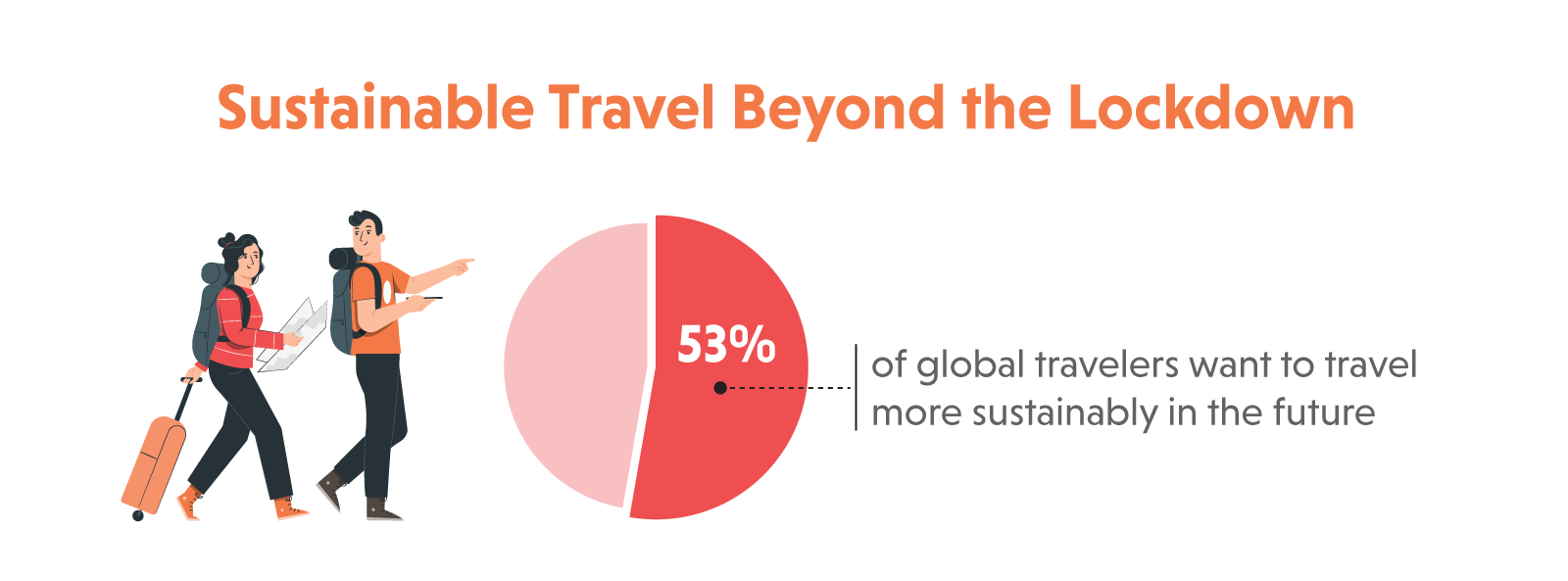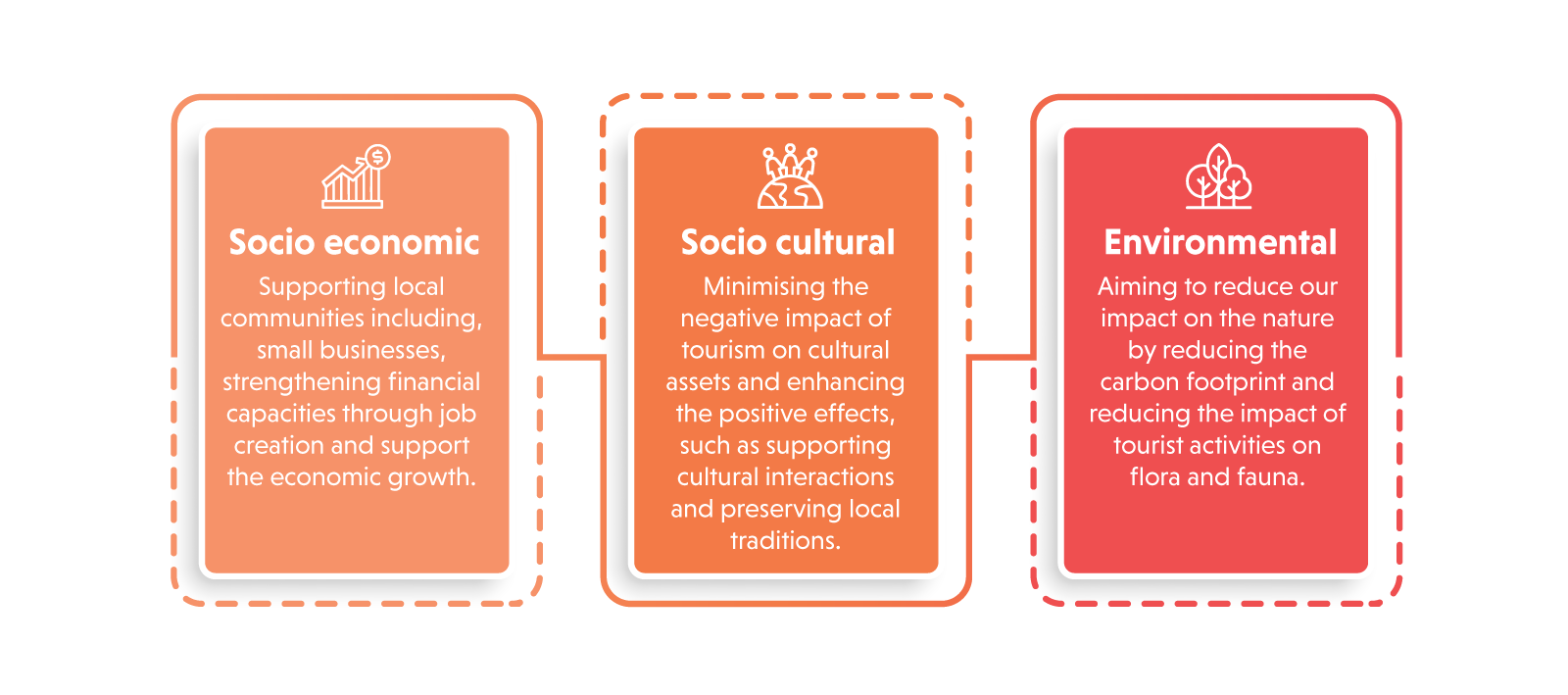By Reeves Mathews
It is no secret that the hospitality industry has undergone many changes over the last few years. Simultaneously, the global health crisis and economic challenges made consumers undergo certain behaviour changes. These consumer changes, responsible travel organisations, conservation NGOs, and purpose-driven travel bloggers together contributed to incorporating sustainability and purpose into travel habits.
Travellers today are thinking twice before they embark on an adventure. The conversation around travel and sustainability grew, working to minimise the negative effects of tourism and turn travel into a positive force around the world.
According to Forbes, purposeful travel is expected to be one of the biggest trends in travel and hospitality in 2023 and beyond.
Purposeful Travel: A Deeper Look
In a study done by Booking.com, 69% of respondents anticipated that the travel industry will offer more
sustainable travel options in future.
Source: EHL Insights
Creating Meaningful Experiences: What to Expect?
This includes preserving monuments, cultural heritage, ethnic groups, living cultures, local cultures, and
indigenous groups
Ways purposeful travel happen
A study by the World Travel and Tourism Council highlighted the adverse effects of overtourism; which is the overcrowding from an excess of tourists that results in conflicts with locals and disturbances to eco-systems. According to the publication, there are five major challenges of overtourism:
- Alienated local residents
- Degraded tourist experience
- Overloaded infrastructure
- Damage to the natural environment
- Threats to culture and heritage
Smarter and responsible decisions taken by everyone in the hospitality industry are helping overcome to effects of overtourism, and purposeful travel is one of the many ways that can be done. Purposeful travel can take the form one or more of the following types of tourism.
Sustainable tourism
Sustainable tourism refers to travel experiences where travellers are eco-conscious. They try to ensure that their presence and spending have a positive impact on local communities. Sustainable tourism also occurs through travellers actively involved in eco-conservation projects or the preservation of natural environments.
Adventurous travel
In adventurous travel, the travellers aim to do something out of the ordinary and experience novelty. In adventure travel, they aim to get out of their comfort zone, try new things and even take calculated risks.
Health, well-being and self-improvement
Wellness tourism is one of the thriving sectors in modern hospitality. For instance, yoga and meditation workshops are becoming a target for those who love luxury treatments or relaxing wind-off sessions. Travellers seeking this kind of destinations also prefer peaceful experiences ranging from art classes, mindfulness sessions, and other relaxing facilities such as therapeutic treatments.
Pilgrimages
Pilgrimages offer travellers an opportunity to step completely away from everyday life, connect with the outdoors, and enter a world of self-reflection. This type of sacred tourism entails travel for religious or spiritual purposes and viewing religious monuments and artefacts.
Digital nomadism
Digital nomadism is becoming the new norm of business travel, where travellers seek and cherish the chance to work from anywhere in the world. With the rise of “workcation” and “bleisure“, many travellers now work on the go; and many workers explore sights when they head on business ventures. Business and pleasure are being blended like never before.
Family reunions
The years of lockdown made socialising and connection a valuable experience. As a result, the habit of travelling to reconnect became necessary, and beyond the pandemic, the trend remained.
Steps for hospitality businesses to support purposeful travel
Hospitality vendors, including hotels, restaurants and leisure establishments alike, can support purposeful travel by providing the right tools and resources that align with the needs and preferences of purposeful travellers.
1. Offering personalised experiences
Thanks to today’s data overload, businesses have the perfect opportunity to enable personalised experiences for purposeful travellers. By gathering data on traveller preferences, behaviour, and past experiences, businesses provide tailored recommendations for activities, tours, and local experiences. Real-time data and analytics empower businesses to easily identify which type of travellers prefer interacting with nature, who prefers to support small businesses or who would love recommendations about a local temple.
2. Practising sustainable hospitality
Brands are going green, and many purposeful travellers prioritise sustainable practices. Digital migration and cloud architecture have already helped brands reduce their paper trail, avoid resource wastage and minimise their impact on the environment. Hospitality businesses can also leverage technology to showcase their commitment to sustainability through features such as energy-efficient lighting, water conservation, and recycling programs. Venues can also encourage guests to engage with the sustainable standards of their brands and foster a generation of eco-conscious travellers.
3. Providing digital amenities
Purposeful travellers value convenience and efficiency; hotels can leverage technology to offer digital amenities such as mobile check-in, digital room keys, guest engagement applications and in-room tablets for ordering services and amenities. Additionally, digital solutions such as apps, interactive guest-facing screens and kiosks can be used to provide guests with all that they need, ranging from information about local attractions to hygienic amenities in the heart of the wilderness.
4. Increasing health and wellness offers
Many purposeful travellers prioritise health and wellness during their travels. Hotels can offer technology-based amenities such as fitness apps, mindfulness apps, on-demand fitness classes, yoga facilities and in-room meditation sessions to support the well-being of their guests. Additionally, virtual reality-based stress management systems and biohacking treatments can offer new kinds of experiences to guests, enabling them to experience wellness in the most advanced manner.
5. Sharing local knowledge
Another trend among purposeful travellers is that they often seek out authentic, local experiences. Hotels can leverage technology to provide local recommendations for restaurants, attractions, and events based on the traveller’s interests and preferences. These services range from interactive maps to virtual tours and local guides. Partnerships with local brands and promoting them via technology offers a win-win for everyone; where local brands get recognised, guests get to know about their favourite types of attractions and hospitality brands are able to foster customer trust.
Future of travel experiences amidst purposeful travel
Purposeful travel focuses on creating better places to visit as well as live; at its core are experiences that benefit both the visitors and the location. It prioritises the enjoyment and luxury of the traveller without compromising cultural and environmental assets. By infusing a journey with purpose, the global traveller community can enhance tourism’s value and minimise its negative effects on nature and local communities.
Curated travel plans that align with the passions of travellers enable them to enjoy, create meaningful memories and connect better with their destinations. The future of hospitality amidst the growth of purposeful travel will be one that requires more thought and heart, in which that extra effort and thought put into their travel plans will ensure more sustainable hospitality that eradicates the damage of overzealous tourist activities.



